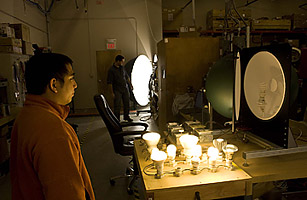
This may sound too good to be true, but the U.S. has a renewable-energy resource that is perfectly clean, remarkably cheap, surprisingly abundant and immediately available. It has astounding potential to reduce the carbon emissions that threaten our planet, the dependence on foreign oil that threatens our security and the energy costs that threaten our wallets. Unlike coal and petroleum, it doesn’t pollute; unlike solar and wind, it doesn’t depend on the weather; unlike ethanol, it doesn’t accelerate deforestation or inflate food prices; unlike nuclear plants, it doesn’t raise uncomfortable questions about meltdowns or terrorist attacks or radioactive-waste storage, and it doesn’t take a decade to build. It isn’t what-if like hydrogen, clean coal and tidal power; it’s already proven to be workable, scalable and cost-effective. And we don’t need to import it.
This miracle juice goes by the distinctly boring name of energy efficiency, and it’s often ignored in the hubbub over alternative fuels, the nuclear renaissance, T. Boone Pickens and the green-tech economy. Clearly, it needs an agent. But it’s a simple concept: wasting less energy. Or more precisely, consuming less energy to get the same amount of heat for your shower, light for your office and power for your factory. It turns out to be much less expensive, destructive and time-intensive to reduce demand through efficiency than to increase supply through new drilling or new power plants. A nationwide push to save “negawatts” instead of building more megawatts could help reverse our unsustainable increases in energy-hogging and carbon-spewing while creating a slew of jobs and saving a load of cash.
Now this may sound like Jimmy Carter’s 30-year-old plea for us to turn down the heat and put on sweaters or like an eco-lecture nagging
us to turn off lights, drive less and otherwise change our behavior to save energy. It would
be nice if we did, but that’s conservation, not efficiency. We don’t have to sacrifice comfort or change routines to get efficient. Doing less with less may be admirable, but efficiency is about doing the same or more with less. And studies
by groups as diverse as the Natural Resources Defense Council , the U.S. Chamber of Commerce and even the National Petroleum Council have identified efficiency as the way
to start addressing our energy and climate crises. In fact, we’ve already started; the Alliance to Save Energy calculates that without the efficiency gains we’ve made since the last energy crisis, in 1973, our economy would use nearly 50% more energy today. That’s more than we get from oil, twice what we get from coal or natural gas and six times what we get from nuclear plants.
But we could save much more. A McKinsey study found that a global effort to boost efficiency with existing technologies could have “spectacular results,” eliminating more than 20% of world energy demand by 2020. Efficiency guru Amory Lovins argues that today’s best techniques could save the U.S. half our oil and gas and three-fourths of our electricity. That would mean no more imports from the Middle East, lower utility bills for everyone and a big step off our path toward a hotter planet. Honeywell CEO Dave Cote brags that widespread adoption of just his own company’s efficiency products could slash U.S. energy use 20%. “There’s a huge amount of low-hanging fruit,” he says.
There are two basic ways to save energy without deprivation or daily effort. We can use more efficient machinery, like fuel-efficient cars that guzzle less gas, or those pigtailed compact fluorescent lightbulbs that use 75% less power than traditional bulbs, or state-of-the-art refrigerators that are three times as efficient as 1973 models. We can also use machinery more productively. That can be as simple as insulating pipes and ducts, caulking doors and windows and otherwise weatherizing our homes to avoid heating our attics and the outdoors. Or installing motion sensors and programmable thermostats that turn out lights and air conditioners when no one’s in the room. President-elect Barack Obama noted on the campaign trail that if we all just properly inflated our tires and maintained our engines, we could save as much oil now as new offshore drilling would produce by 2030. And since buildings devour two-thirds of our power, commercial and industrial operations can weed out even more waste through green construction and automated systems that practically import power as needed. “We’ve hit rock bottom in our addiction to fossil fuels,” says Ian Bowles, Massachusetts energy and environmental affairs secretary. “We need an intervention, and energy efficiency is it.”
See the top 10 scientific discoveries of 2008. See the 50 best inventions of 2008.